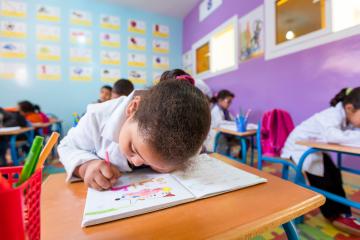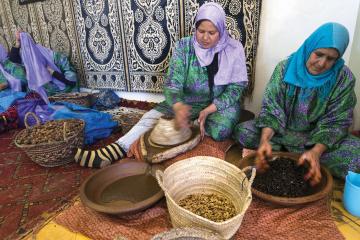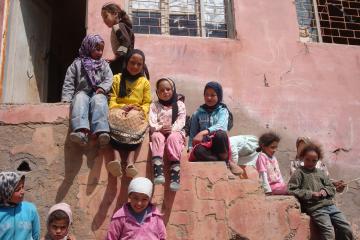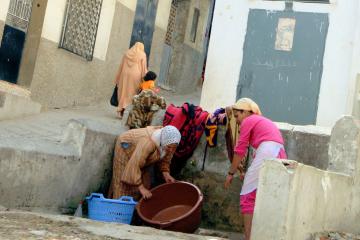Morocco Innovation and Evaluation Lab
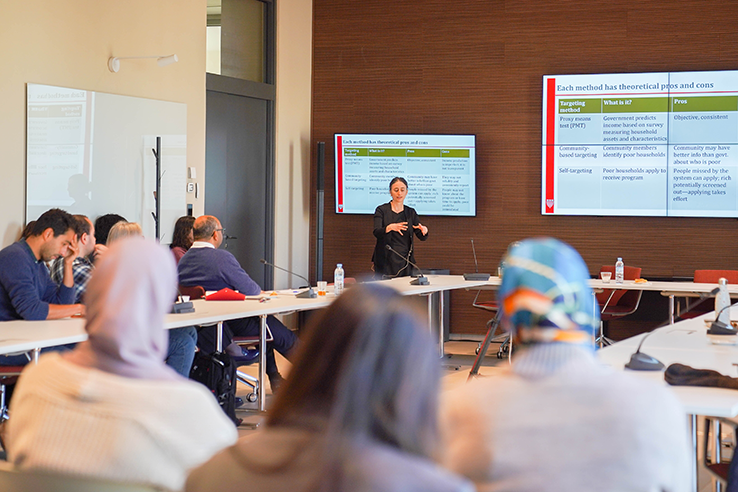
Overview
The University Mohammed VI Polytechnic (UM6P) is partnering with the Abdul Latif Jameel Poverty Action Lab (J-PAL) at the Massachusetts Institute of Technology and the Harvard Center for International Development (CID) to establish the Morocco Innovation and Evaluation Lab (MEL). The Morocco Innovation and Evaluation Lab emerged from the Morocco Employment Lab, an initiative that was launched in 2020 in partnership with the Millennium Challenge Account - Morocco Agency (MCA-Morocco) and hosted by the Policy Center For the New South. With the support of Community Jameel, the lab is expanding its work beyond employment into sectors such as education, social protection, firm growth, agriculture, and environment.
The MEL works in close collaboration with the public, private, NGO, and philanthropic sectors in Morocco to conduct evaluations that speak to their priorities and share rigorous evidence to inform their decisions
Collaborators

Key facts
Sector: Labor Markets, Education, Social Protection, Firms, Environment, Agriculture
Office: J-PAL MENA
Directors: Bruno Crépon, Rema Hanna, Florencia Devoto
Contacts: Maria Rhomari, Sara Ameziane Hassani
Activities
Research
Working with implementing partners in Morocco, J-PAL affiliated professors and CID faculty affiliates conduct rigorous impact evaluations that answer key development questions via cutting-edge tools. The foundation of our research approach is the randomized evaluation: a methodology that randomly selects program and comparison groups, implements the program, and compares outcomes across groups to identify causal impacts.
Policy
The MEL identifies research questions relevant to decision-makers in Morocco and shares research results and policy recommendations to ensure that evidence informs policy decisions. We help local actors that are interested in evaluating their programs to identify and work with researchers in the J-PAL and CID network to conduct new evaluations and to scale up programs based on rigorous evidence.
Education and training
To foster a culture of evidence-based policymaking, one of the MEL’s primary goals is to build Moroccan decision-makers and academics’ capacity to generate and use rigorous research. Our training resources include a variety of practitioner- and academic-focused workshops and certificate courses tailored to the needs of participants.
Staff
Florencia Devoto (Lab Director)
Jamila Ayoub (Operations, HR, and Finance Manager)
Hamza Zakraoui (Project Development & Strategic Lead)
Quentin Daviot (Research Manager, EVAL-LAB)
Maria Rhomari (Senior Policy Manager)
Sara Ameziane Hassani (Policy Associate)
Najiba El Amrani Mida (Senior Research Associate)
Ahlam Labiad (Research Associate)
Youssef Assarssah (Research Associate)
Arthur Bluche (Research Associate)
Laure Lépine (Research Associate)
Ayoub Chaabi (Research Associate)
Kenza Sabri (Research Associate)
Hajar Elherichi (Research Associate)
Events
Upcoming
Check back for upcoming events.
Past
Evidence-to-Policy Conference (June 25, 2025)
The one-day conference, titled “Toward Evidence-Based Development: Climate Change, Education and Employment in Morocco,” offered a platform for Moroccan decision-makers and international researchers to jointly discuss how rigorous impact evaluations can drive effective policy.
Evaluating Social Programs Training (July 3 - 5, 2024)
About forty participants from public institutions, international and non-profit organizations seeking to learn about rigorous impact evaluations participated in this comprehensive three-day training course at UM6P on evaluating social programs (ESP). Taught by J-PAL affiliated professors and senior staff, the training marked the official re-launch of the MEL and its commitment to evidence-based policy implementation and also included a networking session between participants and researchers as well as between international and local academics.
Experimentation and Evaluation Put Forward as Key to Morocco's Development (May 25, 2021)
In this event, the chairman of Morocco’s Special Commission for the Development Model presented the report on the New Development Model to His Majesty King Mohammed VI. The mandate of the Commission was to analyze the Kingdom's current development path and to outline a new development model, relying on a broad participative approach.
Training of Trainers for the Building Capacity to Use Research Evidence Program (March 23 – April 2, 2021)
This "Training of Trainers" workshop equipped Moroccan instructors to teach Harvard EPoD’s Building Capacity to Use Research Evidence (BCURE) blended learning curriculum, with the goal of improving the technical skills and motivation needed to increase data and evidence use among policymakers.
Learning How, Why, and When to Use Randomized Evaluations to Rigorously Measure Social Impact (March 1-9, 2021)
This seven-day, online executive education course provided participants with an in-depth look at how, why, and when randomized evaluations can be used to rigorously measure the impact of social policies and programs.
Smart policy design and implementation framework to improve labor markets in Morocco (October 13, 2020)
This second training event led by the Morocco Employment Lab (MEL) aimed at explaining the Smart Policy Design and Implementation (SPDI) framework for rigorous evaluation applied to labor policy in Morocco.
Leading evidence-based labor policies in Morocco (October 5-6, 2020)
This first training event led by the Morocco Employment Lab (MEL) gathered senior officials from key labor market institutions.
Publications
Prospective evidence on successful remediation in Morocco's public primary schools
In partnership with the Ministry of National Education, Preschool, and Sports (MENPS), the Morocco Innovation and Evaluation Lab (MEL) conducted an impact evaluation of the Pioneer School Program, which was introduced in 626 public primary schools during the 2023/24 academic year. Using a non-experimental method, the evaluation demonstrated that the program, which integrates structured pedagogy, targeted remediation, and teacher specialization among others, produced significant positive effects on student learning. The study was led by Hosam Ibrahim (University of Minnesota), J-PAL invited researcher Andreas de Barros (University of California, Irvine), Sarah Deschênes (World Bank), and J-PAL affiliate Paul Glewwe (University of Minnesota). To learn more about the study, please send an email to: [email protected]
COVID-19 in Morocco: Labor Market Impacts and Policy Responses
The COVID-19 in Morocco: Labor Market Impacts and Policy Responses report presents an analysis of the impact of the COVID-19 crisis on the Moroccan economy, focusing on labor markets. The objective of the paper is to inform the Moroccan government’s pandemic response. The paper was prepared by the Morocco Employment Lab, a project led by the Jameel Poverty Action Lab (J-PAL) at the Massachusetts Institute of Technology, Evidence for Policy Design (EPoD) at the Harvard Kennedy School, and hosted at the Policy Center for the New South, a local Moroccan think-tank. You can read the full paper here in English.
Highlights
The Impacts of Microcredit in Rural Morocco
Cash Transfers for Education in Morocco
Job opportunities
- Policy and Training Associate
- Research Manager, Education
- Senior Research Associate, Education
- Research Associate(s), Education
- Research Associate, Long-term effects of cash transfers to women, Morocco Innovation and Evaluation Lab, Morocco - UM6P/J-PAL/CID
- Research Associate, Labor, Morocco Innovation and Evaluation Lab, Morocco - UM6P/J-PAL/CID
